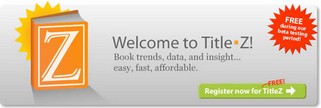A Tool For Amazon.Com
Over the years, I’ve talked with a number of writers about their Amazon ranking. If you don’t know, Amazon.com ranks all of their books depending on sales. The bestselling books have low numbers and the books which rarely sell have very high numbers (in the millions). The trap with this information for writers is to fixate on your particular sales number. It’s like many other things in life, you check your number just out of curiosity and interest of what’s happening in the largest online bookstore on the planet—not so you add to your worry or concern. Particularly for the top books, these numbers change every hour so you can waste a lot of unnecessary energy on it.
OK, with this caveat in mind, I’m going to tell you about a new tool that’s in beta format called TitleZ. (Thanks to Jerome Teel for pointing out this site to me. Make sure you read his book, The Election.) The registration for TitleZ is free and easy. The site revolves around these sales rankings on Amazon but TitleZ provides an easy method to track these sales numbers over a period of time—and also to compare the rankings to other books.
The developers have some interesting articles on their website such as What’s A Good Sales Rank for a Book? Also they have some detailed information about how to use the tool for research.
Here’s a couple of ideas about how you can use TitleZ:
First, you can see how your book is performing on Amazon compared to your competition. Every book competes with something so what is the competition for your book? Which books appear in the same section of a brick and mortar store? When you look at your book on Amazon which titles does Amazon suggest as additional titles to purchase (these titles are potentially your competition—Amazon isn’t 100% here so I say potentially). With a few clicks, you can set up this matrix and check it once a week or whatever schedule is convenient for you.
Second, when you are creating a book proposal or thinking about creating a book proposal, you can use TitleZ to learn about the sales potential for your competitive titles. Often sales numbers for books are difficult to obtain. Many publishers keep this information tightly controlled—unless they have a bestseller to trumpet then they tell the world about your book sales. If your competitive title has a very high sales rank (like in the millions), then you can guess there are not many sales for this book but if you discover a low sales number, then you can guess the other extreme—that the title is continuing to sell (even if it has been in print for several years).
Like most of these tools, they have to work for your situation or you shouldn’t bother. I have found some value to it and thought I’d pass it along to you—especially since for now it’s free (they plan to charge for it later according to the registration information). Just use the tool and don’t fixate on the numbers.






















3 Comment:
Terry,
Neat idea, simple registration, and for now it's free. What could be better. And it's a lot easier than going to Amazon every week and finding that your work has bounced from 1,543,798th to 322,415th--whatever significance that has.
Thanks, as always, for the great information you give us.
Terry, great post. It is fun to look at the sales rankings (actually it can become an obsession) but there is little correlation between the rankings and actual sales. Barnes & Noble also has a sales ranking for their books. If you read some articles on-line, then you will see that the way B&N calculates its sales rankings is different from Amazon. However, neither ranking can give an author any indication as to how many books were sold during a particular time frame.
This is a great find. Thanks for sharing it with us.
Post a Comment
That's the writing life...
Back to the home page...